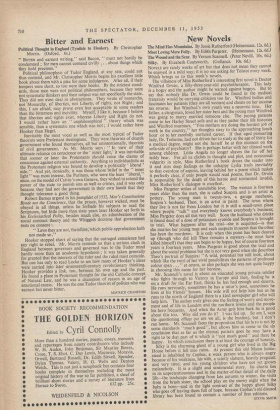New Novels
NOVELS are rarely works of art but that does not mean they cannot be enjoyed in a mild way; it is no use asking for Tolstoi every week. Which brings us to this week's novels.
The villainess of Miss Rutherford's interesting first novel is Doctor Winifred Orwin, a fifty-three-year-old psychotherapist. This lady is a bogey and the author might be warned against bogeys. But to say that nobody like Dr. Orwin could be found in the medical fraternity would be carrying criticism too far. Winifred bullies and fascinates her patients (they are all women) and cheats on her income tax returns. But Winifred's own youth was a neurotic time. Her father, a clergyman, loved her sister best and the young man Winifred was going to marry married someone else. The paying patients come to her Harley Street sofa and as they patter their life histories and Winifred murmurs, "You.mothers are doing the hardest job of work in the country," her thoughts stray to the approaching lunch hour or to her.carefully nurtured career. If that aged pioneering lady, Dr. Treherne, had not driven her to study at the age of thirty for a medical degree, might not she herself be at this moment on the sofa-side of psychiatry? She is perhaps better with her clinical work among children. Little Angela no longer shaves the fur off her teddy bear. For_all its clichés in thought and plot, and occasional vulgarity in style, Miss Rutherford's book draws the reader into it and stirs deep feelings as the unhappy Lydia trails inevitably to that overdose of aspirin, leaving behind her a poem' which makes it perfectly clear, if only people would read poems, that Dr. Orwin is responsible for the death of this heroic and tormented invalid. Miss Rutherford's dialogue is excellent.
Miss Pargeter writes of unsuitable love. The wbman is fourteen years older than the man, she is called Suspira and is an artist in pottery. The young man is twenty-two, a garage mechanic. Suspira's husband, Theo, is an artist in paint. The town where they live is not far from London but it is still a small-town place where people "talk" and everybody knows everybody's business; Miss Pargeter does all this very well. Soon the husband who drinks is found dead of a dose of potassium cyanide and Suspira is brought to trial. What happens after the trial—she is acquitted—is that she marries her young man and each suspects in secret that the other has been the murderer. It is only when this point has been cleared up (though who did kill Theo remains a mystery—he must have killed himself) that they can begin to be happy, but of course fourteen years is fourteen years. Miss Pargeter is good about the trial and about the social problems but she is not very good when she &scribes Theo's portrait of Suspira: "A wild, potential but still look, about which like the swirl of her vivid possibilities the patterns of profound colour span . . ." et cetera, as also perhaps she was not quite happy in choosing this name for her heroine.
Mr. Scannell's novel is about an educated young private soldier who fights through to Victory in Europe and then, finding he is on a draft for the Far East, thinks he has had enough and deserts. He runs nervously, sometimes he has a tutor's post, sometimes he lives at his friends' houses. His wife will not help him but as he runs to the north of England there is a kind newspaper girl who will help him. The author truly gives one the feeling of worry and move- ment and of life in London and the northern towns and the people his hero frequents. And when the Army getb him back he is good about this too. Why did you do it? I was fed up. So am I, says the questioning officer (so are we all, is the burden), but I don't run home. Mr. Scannell faces the proposition that his hero is not by some standards "much good", but allows him to come to the sly conclusion that as far as the eternal pattern goes he may have a right to be that part of it which. is "not much good" and there be happy. In which conclusion there is at least the courage of honesty. Silky is the charming ghost of a young girl who lived in the Big House before it fell into ruins. At present this old Maine home- stead is inhabited by Cephas, a weak person who is always angry because of his weakness, his wife, a saintly slattern, heavily pregnant and very tired, and his young children who have not yet grown melancholy. It is a slight and sentimental story. Its charm lies in its unpretentiousness and in the matter-of-fact detail of the.daily life—the landscape changing from late autumn to winter, the visits from the brash sister, the school play on the snowy night when the baby is born—and in the light contrast of the happy ghost Silky who goes off leaving them full of hope, because Cephas's old disused library has been found to contain a number of first editions.


































 Previous page
Previous page